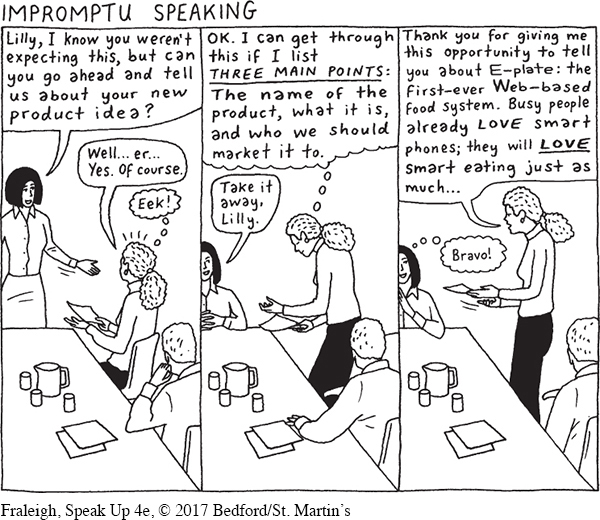Impromptu Speaking
In some situations, you may be called on to speak unexpectedly. Impromptu delivery means that you are generating your speech content in the moment, without time to prepare in advance. These kinds of speeches are both quite common and very challenging for inexperienced speakers. They occur regularly in a variety of situations: you might be called on to speak at a meeting at the last minute, to comment in a class, or to offer a spur-
Although such situations can seem terrifying for new speakers, it is possible to handle them effectively if you follow a few simple guidelines for impromptu delivery. The key is to remember that even in a spontaneous speaking situation, you can still present from a mental outline that you draft quickly and keep in your mind, just as you would with a physical outline in an extemporaneous situation. (Or if you have a few moments to collect yourself, you might try to jot down your main points.) You can pull together a mental outline by quickly asking yourself the following questions:
What is the question or topic? Begin by thinking carefully about the precise nature of the question or topic you have been asked to address. In speech parlance, this is sometimes referred to as thinking about the call of the question/topic. Ask yourself, “What is the specific topic to speak about? What is the specific question to answer?” Be precise here.
375

What is my answer or view? As you are developing a mental outline, consider what you think about the topic or what you think the answer to the question is.
How do I support my position? Consider the reasons that support your view or your answer.
Your answers to these questions should quickly yield a precise thesis or topic statement that also serves as a preview of the organization and body of the speech. This entire process can occur in a matter of seconds.
376
Because this is an impromptu speech, people will not expect a carefully prepared introduction; thus, a direct one will suffice (for example, “I’m delighted to tell you what our division has been developing this year”). Your conclusion need only summarize your points and restate your position (for example, “So that’s what we’ve been working on this year. I hope you’re all as excited about these new products as we are”).